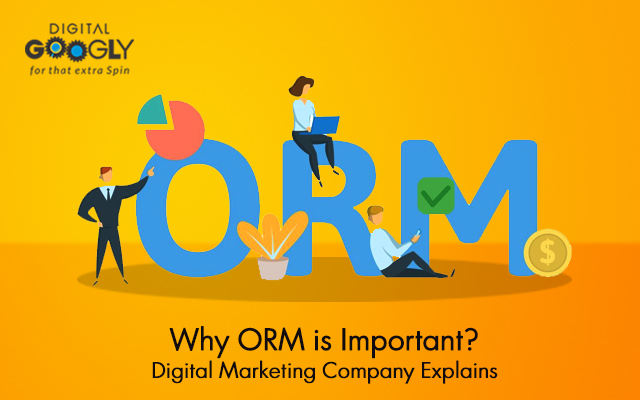Reputation takes time to build, but to destroy it, all it takes is a stable internet connection and an angry customer.
Even with the best customer service, a company’s reputation can suffer from time to time.
A disgruntled customer posts a negative review for all to see on the Internet. Or a negative media story spreads far beyond your expectations. And down goes your reputation points.
But there is a way to save and even boost your reputation in the eyes of your audience. The way – online reputation management.
At Digital Googly, a digital marketing company in Kolkata, along with providing digital marketing services, we also manage our clients’ online reputations.
Active reputation management helps us minimize negative customer feedback and keep our clients’ online presence positive.
Want to take charge of your reputation but don’t know where to start? This blog will walk you through the what, why, and how of online reputation management—including some basic principles.
Let’s get started.
What is Online Reputation Management?
Online reputation management (ORM) is when you monitor mentions of your brand on websites and social media to acknowledge, reply to and boost positive comments and address any negative or false statements.
When people search for you on the Internet, ORM includes the usetechniques and strategies to ensure that they find the right materials that improve your brand’s perception.
The goal of ORM services in Kolkata is to strike a balance, counteract misleading trends, and allow you to showcase yourself in the best light.
Why is Online Reputation Management Important?
You might be thinking, what can a few negative reviews and comments here and there do to your brand. Well, a few negative remarks cannot change your audiences’ perception of your brand, but what happens if these few drops of negativity start adding up.
According to the digital marketing executive of Digital Googly, a digital marketing company in Kolkata, on the Internet, a tiny spark can turn into a wildfire, and there are numerous examples of that available.
Here is an example to help you understand why you need a good ORM strategy on your side.
In 2010, the non-profit Greenpeace company launched a campaign against one of Nestlé’s leading products, KitKat, concerning palm oil, the direct destruction of forests, and the death of orangutans.
Greenpeace supporters changed their profile pictures to anti-Nestle slogans after being encouraged by Greenpeace. Users also left comments on Nestle’s Facebook page.
Nestle wrote to users, requesting them not to use any version of their logo (due to copyright violations), or their comments would be deleted. The page administrator’s comments only fueled the fire, triggering the angry online mob effect.
Nestle representative later apologized for retaliating against fans, including the remark about deleting profile photos with the Nestle logo.
What do you think Nestle did wrong?
- They panicked and tried to control an angry mob
- They told people what to do or what not to do when they were already angry
- They tried to take on a social media disaster without a proper plan of action
Like Nestle’s, there are hundreds of reputation disaster examples across the Internet. Do you know why?
It’s because of their negligence in investing adequate time and effort in coordinating with an online reputation management company to develop a sound strategy before the disaster hit.
4 ORM Principles You Can Use
As an online reputation management company in Kolkata, we help our clients establish a positive brand image and address negative reviews and comments. Our strategies to manage reputation are varied and personalized according to our client’s needs and goals.
However, all of our strategies are based on these four basic principles, which you can also use to take hold of your online reputation.
Answer promptly and with empathy
The most effective ORM occurs before a negative comment or review gets published. To reduce the possibility of negative reviews, you should make sure that you respond quickly when your customers ask questions.
Apart from being prompt, you also need to be empathetic in your responses. Let the customer know you’re invested in finding a solution to their problem and are there to help.
Address negativity upfront
It’s easy to dismiss negative feedback and reviews from customers. After all, why would you respond and draw attention to them?
But the truth is that ignoring dissatisfied customers is detrimental to your business. A lack of response can come across as a confirmation of bad press.
On the other hand, responding to negative reviews demonstrates to customers that you will be there to help them if they have a problem with your business.
Own up to your mistakes
It’s always good to apologize if your company is under fire for an actual or perceived scandal.
Remorse helps to defuse tense customer situations and strengthens relationships. It also shows customers that your business is trustworthy and open.
Create your apology with the sincere intention of accepting responsibility and resolving the problem. Directly address the main concerns raised by customers and the media, and explain how you plan to resolve the situation.
Stay on top of search results
SEO is a crucial tool for increasing brand visibility and reducing the visibility of negative press and content related to your company.
When someone searches for your company name, you want your page to come up first. After all, customers are 10 times more likely to click on the first search result (SERPs’ number one result receives more than 31% of all clicks.)
Hence, if you are looking to hire an online reputation management company in Kolkata, we can be of much help due to our expertise in providing SEO services.
If you have any further queries regarding ORM, give us a call at 83369 20676 (we provide free consultations.)
